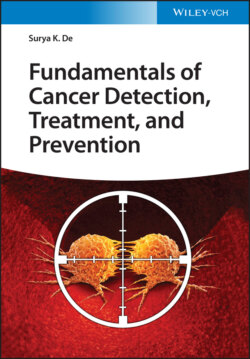Читать книгу Fundamentals of Cancer Detection, Treatment, and Prevention - Surya K. De - Страница 53
2.3 Immunosuppression and Infectious Agents
ОглавлениеInfection by certain environmental pathogens can significantly weaken the body's immune system, rendering it less able to detect and destroy cancer cells or to fight off infections that are linked to cancer. Human immunodeficiency virus (HIV) is one such pathogen, and people with this condition are at risk of developing several cancers. Those with HIV/AIDS have an increased risk of cancers that are caused by infectious agents, including Epstein–Barr virus (EBV), hepatitis B (HBV) and hepatitis C (HCV) viruses, infections that can cause liver cancer, human herpesvirus 8 (also known as Kaposi sarcoma‐associated virus), and human papillomavirus (HPV) (Figure 2.1), which has been associated with cervical, anal, oropharyngeal, and other cancers [14–16].
Most of the viruses associated with the possible start of cancer can be spread from one person to another through blood and/or other body fluids. By avoiding “risky behaviors,” people can lower their chance of infection. One important preventative measure is getting immunized. The HBV vaccine is recommended for certain high‐risk adults, including adults who are sexually active but not in a mutually monogamous relationship, people with sexually transmitted infections, intravenous drug users, men who have sex with other males, and health care or public safety workers who might be exposed to infected blood or body fluids. There is also an HPV vaccine, which is recommended for all girls and boys aged 11 and 12, and available to anyone aged 26 or younger who did not avail themselves of the vaccine as adolescents.
Figure 2.1 HPV infection causes several types of cancers.
Other practical ways to reduce exposure to pathogens linked to cancer development are having safe sex, and in the case of drug users, not sharing hypodermic needles. The more sexual partners an individual has during his or her lifetime, the greater are the chances of contracting sexually transmitted infections like HIV or HPV. Safe sex consists of limiting the number of sexual partners and using a condom. For intravenous drug users, sharing needles with an infected person poses the risk of contracting HIV or infection with hepatitis B or C.
People who receive organ transplants sometimes take medications to suppress the immune system so that the body will not reject the organ. These drugs are immunosuppressive, and like environmental pathogens, weaken the body's immune system so they cannot adequately destroy cancer cells or resist infections associated with cancer.
Transplant recipients have a higher risk of developing several different types of cancers, some of which are directly linked to infectious agents, and others not. The four most common cancers among transplant recipients, which develop more frequently in these individuals than in the general population, include non‐Hodgkin lymphoma (NHL), lung, kidney, and liver cancers. NHL has been shown to be associated with EBV infection.
In addition to certain viruses, infections by some bacteria and parasites can cause cancer or increase its likelihood (Figure 2.2). Viruses can disrupt the cell signaling network that normally controls cell growth and proliferation. Several of these infectious agents can also cause chronic inflammation that may lead to the development of certain types of cancers.
Figure 2.2 Cancer‐causing pathogens: Helicobacter pylori, hepatitis B virus (HBV), hepatitis C virus (HCV), and human papillomavirus (HPV).
